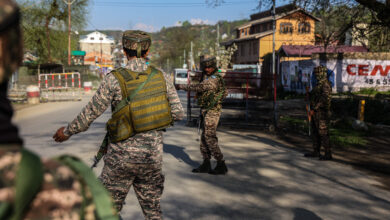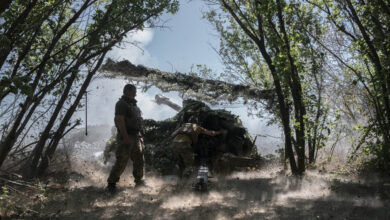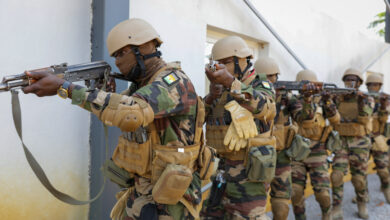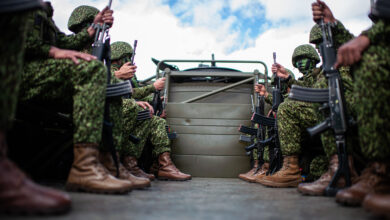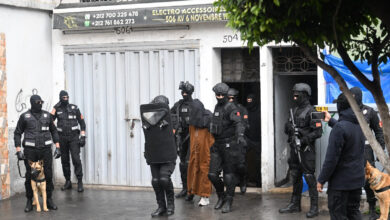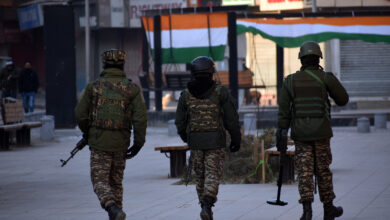At least 10 Malian soldiers were killed on Sunday, April 21 in an attack on Guiré in the Koulikoro region in the center of the country, a security source told AFP.
“There are at least 10 dead soliders,” the source, who asked not to be named, told AFP.
Other reports put the provisional death toll at 12, and some reports said the base was overrun.
AFP later reported the source as saying 12 people were killed “including the post commander, a captain.”
Studio Tamani reported local sources as saying that 16 soldiers had been killed and several were missing.
The Armed Forces of Mali (FAMa) said that soldiers were attacked in Guiré at around 5 a.m. local time and that reinforcements had been dispatched. It said evaluations were in progress and did not give a casualty figure.
In a later release, General de Division Ibrahim Fant said the “Guire security post in the Cercle of Nara was the subject of a violent and complex attack” which left 11 dead and others wounded, as well as material damage.
“The attackers withdrew with about 15 dead in their ranks,” Fant said. “Air and ground reinforcements were immediately dispatched to rescue the wounded, occupy the post” and conduct clearance operations.
A local resident contacted by AFP said there was heavy gunfire and the military “were taken by surprise” in the attack.
“I saw two terrorists put their motorcycles in an army vehicle and drive off with it,” he said.
“The terrorists came out of the forest. They were on motorcycles and pick-up trucks. They burnt vehicles and took away others,” AFP’s security source said.
Guiré is in the Cercle of Nara, around 260 km (160 miles) northeast of the capital Bamako.
Troops from the Malian army and the G5 Sahel Joint Force as well as United Nations peacekeepers have been targeted in the increasingly violent center of the country.
On Saturday, an Egyptian U.N. peacekeeper was killed and four others injured in an improvised explosive device attack on a convoy between Douentza and Boni in the central Mopti region.
On April 9, Malian soldiers shot dead at least one villager and injured four others after an explosion they mistook for an attack in Dioura in the Mopti region. That came less than a month after militants killed 23 Malian soldiers in a raid on the army camp in Dioura.
On March 12, at least six Malian soldiers were killed when their vehicles were struck by improvised explosive devices, also in the Mopti region.
On March 1, nine Malian soldiers attached to the G5 Sahel Joint Force were killed in Boulkessi in the Mopti region when a vehicle in which they were traveling was struck by a roadside bomb
Most of the attacks have been claimed by or blamed on the Support Group for Islam and Muslims (JNIM). JNIM formed in March 2017, when several smaller groups including the Sahara branch of Al-Qaeda in the Islamic Maghreb, Ansar Dine and Al-Mourabitoun merged. JNIM’s leadership has pledged allegiance to Al-Qaeda leader Ayman al-Zawahiri.
Once considered a beacon of democracy and stability in Africa, Mali in recent years has been dogged by a coup, civil war and Islamist terrorism.
On April 18, Mali’s entire government resigned along following criticism over the handling of an upsurge of violence in the center of the country and in particular the massacre of 160 people who were killed in the village of Ogossagou near the border with Burkina Faso on March 23. The government had announced it had replaced senior military officers in the wake of the massacre.
The recent unrest in the Sahel began in Mali in 2012 with Tuareg separatist uprising against the state, which was exploited by Islamist extremists linked to al-Qaeda who took key cities in the desert north.
France began its Operation Serval military intervention in its former colony early the next year, driving the jihadists from the towns, but the militant groups morphed into more nimble formations operating in rural areas, sometimes winning over local populations by providing basic services and protection from bandits.
The insurgency has gradually spread to central and southern regions of Mali, and across the borders into neighboring Burkina Faso and Niger.
Large swathes of the country remain outside government control, despite the 2015 peace accord designed to isolate the Islamists.
The French mission evolved in August 2014 into the current Operation Barkhane, which has 4,500 troops personnel deployed with a mandate for counter-terrorism operations across the Sahel region, with 2,700 soldiers in Mali to support poorly-equipped local military forces.
Troops deployed to Barkhane work alongside other international operations, including the U.N. Minusma stabilization mission in Mali, which began in 2013 and has about 12,000 troops and 1,750 police deployed, as well as the regional G5 Sahel joint counter-terrorism force that aims to train and deploy up to 5,000 personnel.
With reporting from AFP. This post was updated on April 21 and 22.



